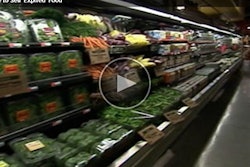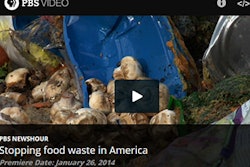| In this Jan. 16, 2010, file photo, a woman carries a bag containing rice donated by the United States Agency for International Development, USAID, as she walks through a market in Leogane, Haiti. U.S. Agency for International Development Administrator (USAID) Rajiv Shah says changes to the way the US distributes food aid could help feed 800,000 more people abroad, many of them Syrian refugees. The changes come in a wide-ranging farm law signed by President Barack Obama last week. A recent bipartisan budget agreement would also help pay for the aid. (AP Photo/Lynne Sladky, File) |
WASHINGTON (AP) — U.S. Agency for International Development Administrator Rajiv Shah says changes to the way the United States distributes food aid could help feed 800,000 more people abroad, many of them Syrian refugees.
The changes come in a wide-ranging farm law signed by President Barack Obama last week. A recent bipartisan budget agreement would also help pay for the aid.
The new farm law would allow the United States to make a small increase in the amount of food aid that is given out as cash or vouchers. Currently, most food aid is grown in the United States and shipped to developing countries, an approach the Obama administration says is inefficient.
Shah said the need for emergency food aid is high right now, especially with a humanitarian crisis in Syria that has caused millions to flee their homes.
"We feel it's a critically urgent time to be as efficient and effective as possible," Shah said in an interview with The Associated Press.
The farm law would make it easier for the government to buy food closer to where it's needed and also would allocate more money toward that local procurement. One way that works is to give recipients cash vouchers for food.
Shah says this gets food to people much quicker than shipping raw commodities, which has been the traditional model for food aid. For example, he says USAID will use some of the extra funds to give vouchers to Syrian refugees — including tens of thousands of children — who are now living in cities in Lebanon and Jordan.
"We can't truck them a bag of wheat," Shah says. "Most of them shop in stores."
He says the resources may also be directed to help with crises in South Sudan and the Central African Republic. USAID has also been working to help people affected by the massive Typhoon Haiyan in the Philippines in November.
"All around the world we are trying to stretch already limited resources," Shah said.
Many food aid groups have long argued that buying food abroad would be quicker, less expensive and more beneficial to local farmers than the current method that benefits U.S. farmers and shippers. The Obama administration in April proposed shifting almost half of the international food aid money to more flexible accounts that allow for cash purchases abroad, saying such a move would be more efficient. The final bill settled on 20 percent, which is higher than the current amount of around 13 percent.
The Obama administration proposal was a tough sell to farm-state lawmakers who oversee agriculture spending and the farm bill and have been reluctant to shift money away from American farmers who ship their commodities abroad. Farm and shipping groups launched strong campaigns against the proposal, lining up opposition in both the House and Senate.
The administration has argued that buying food locally is often the only practical option in war-torn countries where trucking in large amounts of food is not safe and shipping U.S. food can often take several weeks.
Aid groups that have championed the changes said they were pleased that the farm bill made a modest shift in how resources are disbursed, even if it wasn't everything they wanted.
"In the face of emergencies like Typhoon Haiyan, the humanitarian crisis in Syria and rising costs for food and transport, international food aid programs need much greater flexibility in order to be effective and save lives," said Eric Munoz, senior policy advisor for Oxfam America.





















